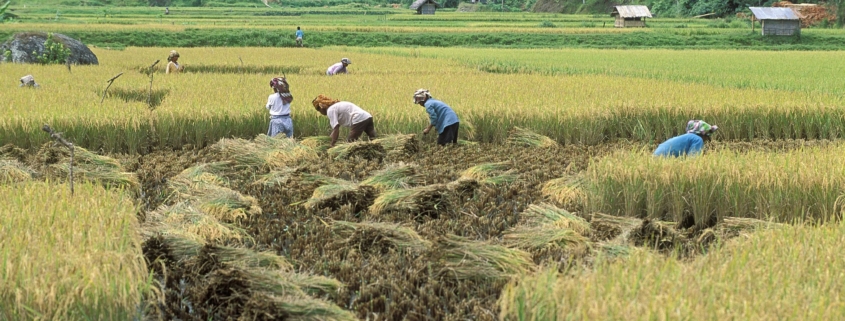Agricultural cooperation is in Australia’s and Indonesia’s best interests
Fostering people-to-people links between northern Australia and Indonesia could improve agricultural output in both countries. They share agri-environmental conditions, providing opportunities for enhanced partnership. Such an approach would also progress Australia’s underdeveloped economic ties with Indonesia.
An agricultural partnership could strengthen the overall bilateral relationship, develop personal links, forge greater shared commitment to peace and security, and better protect Australia’s strategically important north. From the institutional to grassroots level, greater interaction between agricultural stakeholders in northern Australia and Indonesia would allow industries and produce to flourish.
Northern Australia and Indonesia have similar climate zones, including tropical savannahs and tropical rainforests. In turn, the two regions share various agricultural practices, livestock feed types, crops and tropical animal and plant diseases. Despite some differences in their soil types and native flora and fauna, the similarities create abundant opportunities for expanded bilateral exchange of knowledge, capacity building, collaboration and relationship building.
Agriculture is a major sector, employer and economic driver in both Indonesia and northern Australia. The Australian-Indonesian agriculture relationship has traditionally been strong and enduring, despite occasionally strained periods—for example, when Australia banned exportation of live cattle in 2011.
Strengthening ties between primary industry stakeholders in northern Australia and Indonesia generates several mutual benefits, including: improved economic performance that would act as an engine for the development of physical and social infrastructure; access to new markets, including trade in raw goods for further processing; research and development collaboration for approaches in tropical agriculture; biosecurity coordination; and capacity building in technical fields.
There are many ways through which we can facilitate these benefits.
Support for Indonesian agriculture could not be timelier. The Indonesian government’s universal free school lunch plan, aimed at improving nutritional outcomes for the country’s 83 million children, is its current flagship policy—and it needs a strengthened food system.
Indonesia could benefit from Australian agriscience, quality-ensuring standards, workforce training and education, and investment. Indonesia is currently striving for food self-sufficiency, with a focus on staples including rice, corn and cassava. At the same time, it needs to boost protein production.
Its ambitious plans will require significant increase in yields, and a technically skilled workforce. Australian agriculturalists can assist through sharing of existing knowledge suitable to the Indonesian context, and supporting further research into productive opportunities.
This research can be mutually beneficial. For example, Indonesia is home to a native legume species that can provide human nutrition but also enhance protein sources for livestock. Research on these tropical plants for livestock feeds could benefit producers in both Indonesia and northern Australia, and growers could access both markets. Collaborative troubleshooting, plant breeding and agronomic practices could economise the process and foster institutional and economic links.
Australia’s world-class food processing standards—including post-slaughter standards, food safety and a meat standards scheme—ensure meat quality and consistency. Such approaches should be more readily shared with Indonesian red meat and food businesses to help raise food quality, safety, health and nutrition outcomes.
Deeper integration with Indonesian agricultural should enable greater workforce opportunity. For example, the Australian government should consider opening the Pacific Australia Labour Mobility scheme to Indonesia to help resolve northern Australia’s agricultural workforce shortage.
Supporting joint research efforts between northern Australia and Indonesia could allow for more efficient projects. While research costs are lower in Indonesia, Australian universities have access to more funding, advanced facilities, and expertise. Tropical agriculture research spanning both nations would provide greater benefits through increased capacity. Joint crop research can future-proof both nations against the anticipated impacts of climate change on tropical agricultural systems.
Other areas for two-way learning include professional exchange programs, supply chain development, value-added agriculture, biosecurity and pest and disease surveillance.
This learning necessitates respectful and culturally sensitive people-to-people and institution-to-institution links for students, researchers and producers, advancing diplomacy and building the kinds of bridges that can only be achieved by shared endeavours.
Effective collaboration on tropical agriculture must receive appropriate resourcing. Existing funding for people-to-people links, such as the New Colombo Plan Mobility Program—which recently supported Central Queensland University’s participation in a study tour to Indonesia—are impactful investments that should continue with a particular focus on student mobility. Research through the Australian Centre for International Agricultural Research is an effective tool for collaboration and development. Opportunities to link primary producers from northern Australia and Indonesia should receive greater resourcing from both public and private sources.
Barriers and challenges, including visa arrangements, language and cultural hurdles would need careful handling. Respect must be at the centre of any collaborative effort, and simplistic approaches to development must be avoided.
Indonesia is an important partner for Australia and our relationship should feature more prominently in public discourse, particularly across the north. Agriculture is a bridge for growth and diplomacy. As shared and intersecting challenges including global instability, food insecurity and climate change put pressure on agricultural systems, we should look to each other for more support. Australia must continue to commit energy and capital to collaborating with Indonesia and creatively building our relationship and furthering our shared national interests.
CQUniversity Bachelor of Agriculture Students Holli Arthur, Tyler Aspinall, Meg Ingram, Mya Kidd, Maddy Price, Kymberley Teelow and Tina Vale contributed to this article.


